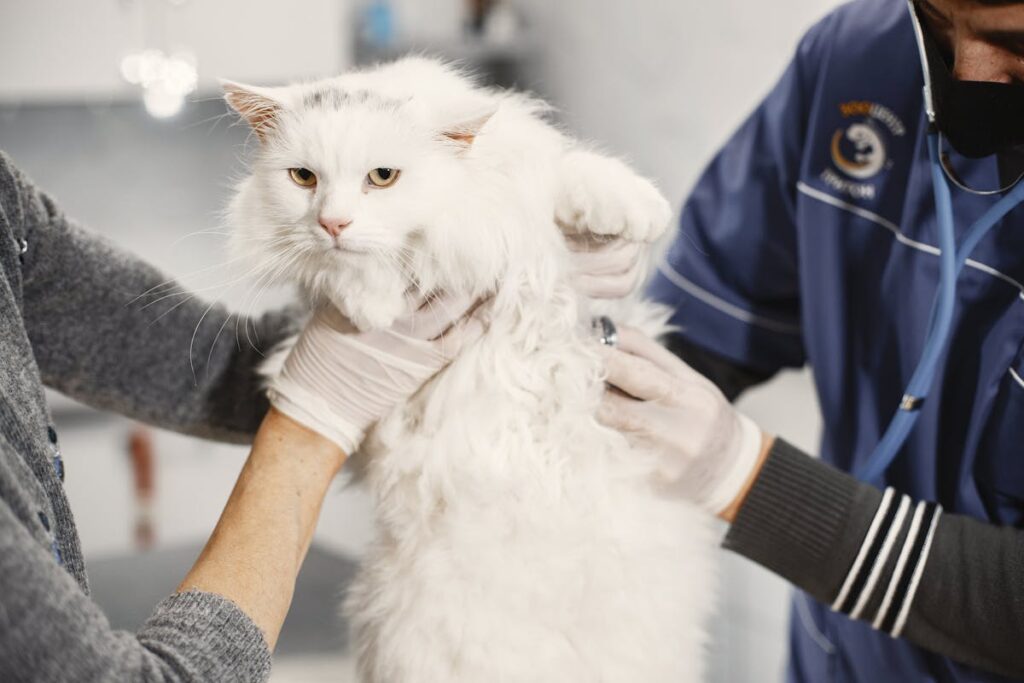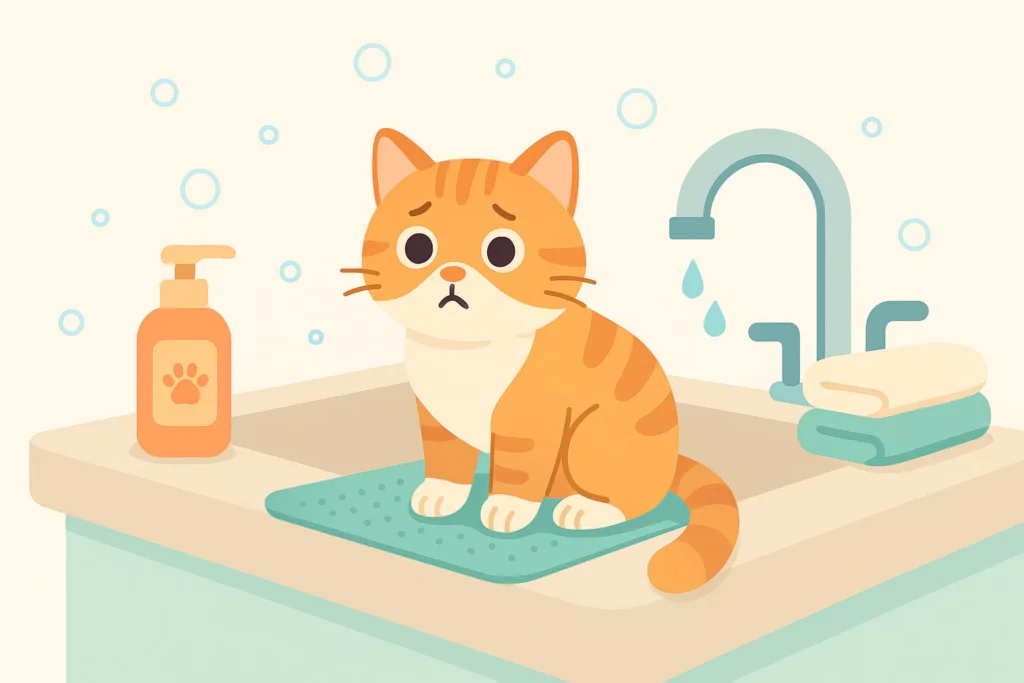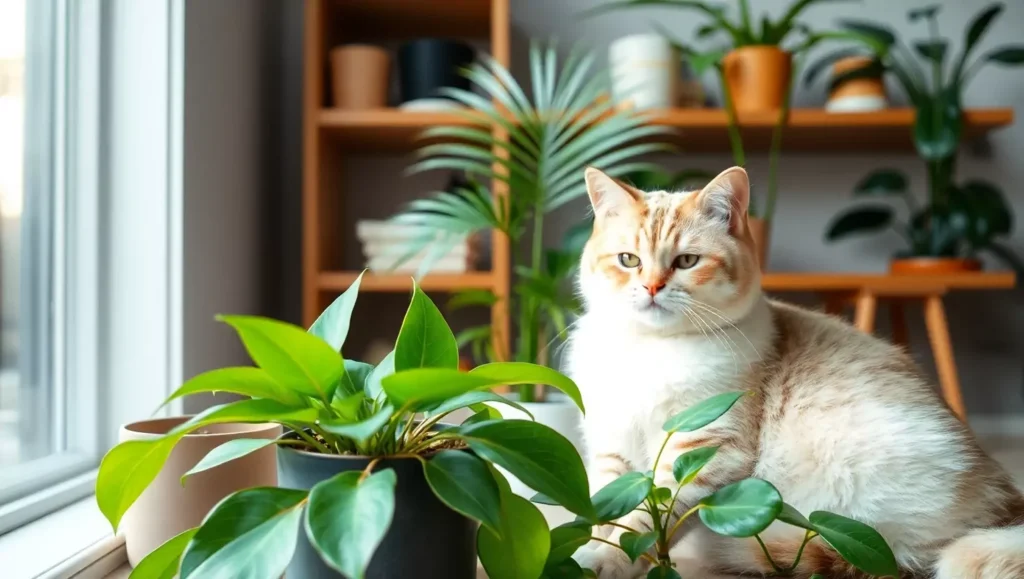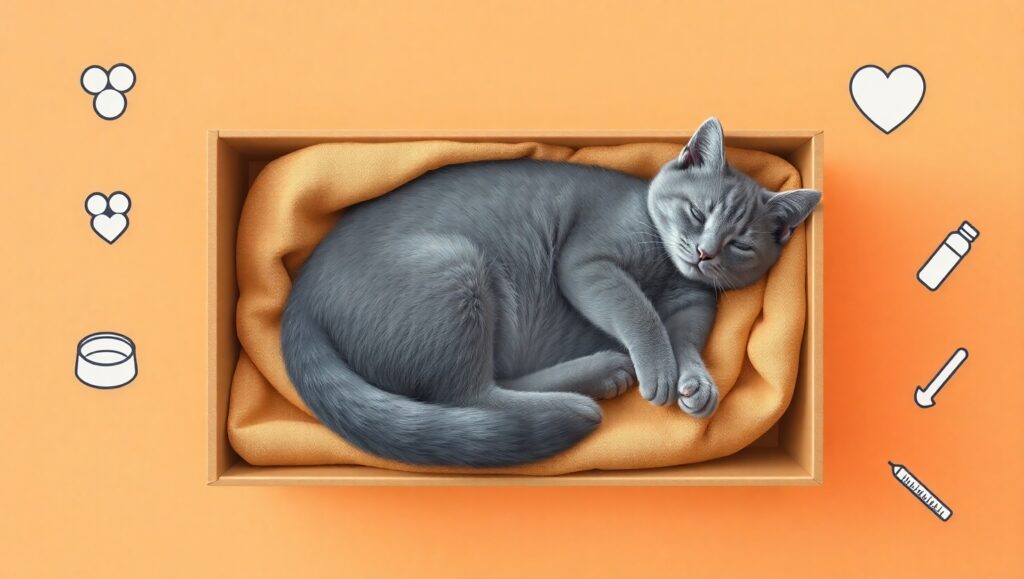Cats are naturally skilled at hiding signs of illness, making it difficult for pet owners to detect when something is wrong.
Despite the fact that they now live in the safety of our homes, their instinct to protect themselves from predators drives this behavior.
Unfortunately, this often means that by the time noticeable symptoms appear, the condition has already progressed.
In this article, I’m going to take you through the early signs of a sick cat, the differences in behavioral and physical signs, and how to determine when to take action. Knowing what to look for can help identify a health issue before it becomes serious and maintain a healthy and Happy Tails feline friend.
Spotting Illness Early: How to Know If Your Cat Is Sick
By the time you see the signs of a sick cat, the illness has likely progressed.
As a cat parent, I have learned in a painful way that cats don’t always outwardly show when something is wrong. One day, your cat is normal, purring, napping, and playing, and the next, they seem a bit off. Cats instinctively hide pain, which is why we must notice the signs of an unhealthy cat.
From a change in appetite and grooming habits to odd behavior or litter box habits – sometimes even subtle changes will let you know that there is something wrong. Typically, these indicators lead to more significant issues, such as kidney disease, dental disease, or infections.
Routine checkups are the most effective way to detect early signs of a sick cat. Check out how often should I take my cat to the vet? to keep your feline healthy.
Recognizing the Symptoms of a Sick Cat
Recognizing the signs of a sick cat early can dramatically change Pet Health outcomes for your pet. By identifying those subtle signs, you can step in sooner, get the proper treatment for illnesses, and help your cat recover more quickly.
- Hiding/avoiding interaction
- Excessive sleep or restlessness
- Weight changes (Rapid weight gain/loss)
- Sudden shift in vocalization: may not vocalize at all
- Sudden mood change: may be withdrawn, clingy, or cranky
- Existing lack of interest in play
- Change in appetite or thirst
- Signs of vomiting or diarrhea
- Constricted or dilated pupils
- Breathing problems like bad breath or rapid breathing
- Changes in eliminations in the litter box
- Increased respiratory rate or difficulty breathing
- Eye or nasal discharge
- Hair loss or visible skin irritation
- Limping or not jumping
- Swelling or visible open wounds
- Droopy/wrinkled eyelids or squinting
- Visible third eyelid
- Grooming issues such as excessive or insufficient grooming
- Signs of dehydration (skin tenting)
- Nocturnal behavior changes, such as yowling, along with other signs of hyperthyroidism.
If your cat has any one of these signs for longer than 24 hours, take action with great immediacy and seek urgent medical attention. Let’s look at the most common symptoms or signs of a sick cat that will help you identify when your cat has become unwell, beginning with changes in behavior.
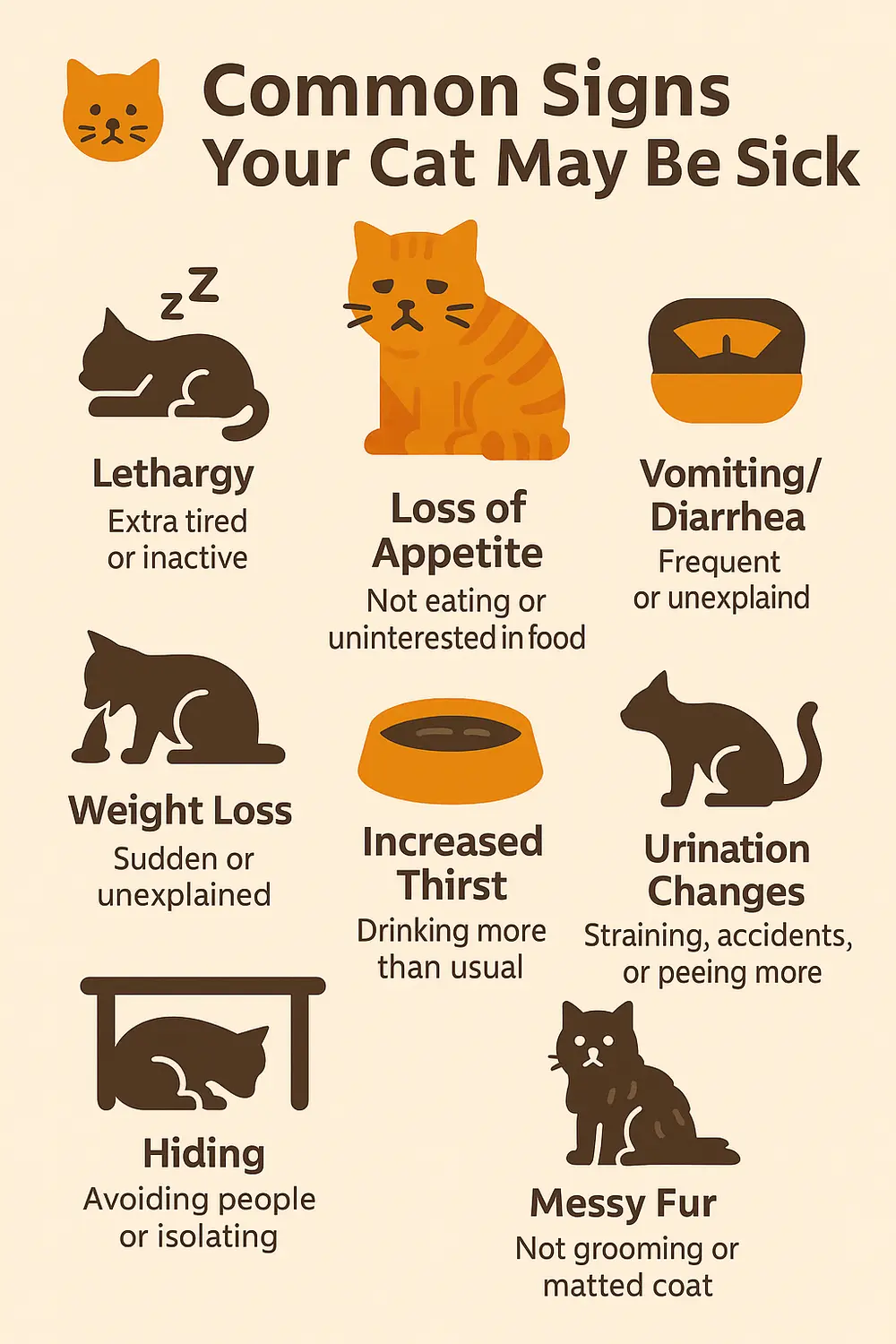
Changes in Body or Appearance to Watch
One of the most noticeable warning signs of a sick cat can be physical appearance or posture. When a cat is suddenly hunched, appears stiff, and exhibits awkward movements, it indicates that the cat is experiencing pain or discomfort.
A dull or greasy coat or a matted coat may also indicate health problems. Changes in skin color variation, visible signs of dehydration, and inflamed gums all indicate potential causes affecting your cat that need to be addressed as soon as possible.
Increased Thirst
If you see your cat drinking a lot more water than usual or frequently going to the water bowl, it may indicate serious underlying conditions. Excessive thirst is one of the classic signs of a sick cat, especially if the cause is diabetes or kidney disease. This behavior is magnified if the cat is also peeing more. You should keep track of how much water your cat is drinking, especially for older cats. If you notice this behavior change, please consult a veterinarian.
Appetite Loss
Cats that suddenly stop eating are sending a strong message that something could be wrong with them. A missed meal or two is no cause for concern. But suppose your cat stops eating for longer than 24 hours. In that case, it can quickly lead to a serious health issue, such as hepatic lipidosis.
Loss of appetite is a common symptom of oral or dental disease, infections, or much more serious illnesses such as cancer. Against the menu of signs of an ill cat, the refusal of food is one of the more urgent signs, and it is imperative to contact your veterinarian immediately.
Changes in Litter Box Habits
Unusual litter box usage is one of the stark signals to look for when gauging signs of a sick cat. Diarrhea, constipation, or frequent attempts at straining can indicate some digestive or urinary problems. A noticeable decrease in urination or any potential signs of discomfort in the litter box is a signal that should not be dismissed for cats, as they may indicate an infection or, worse, a life-threatening blockage.
Difficulty in Breathing or Voice
Any changes in your cat’s behavior, such as breathing patterns or vocalizations, can be severe signs of an unhealthy cat. Wheezing, labored breathing, or breathing with an open mouth may be associated with respiratory or cardiac conditions.
Just as seriously, if your cat suddenly stops vocalizing or seems to vocalize more, there may be an immediate need for veterinary examination to rule out distress due to discomfort or even a neurological issue.
Changes in Eyes, Nose, Mouth & Smell
A sick cat may show critical signs in its facial features. Discharge from the nose or eyes, an unusual odor coming from the cat’s mouth, or a sudden change in the smell of its breath may be due to dental disease, infections, or kidney issues. Facial features such as a visible third eyelid and unequal pupils may also indicate serious internal problems, which should not be overlooked.
Excessive Meowing
A sudden change in your cat’s vocalization can be one of the first signs of an ill cat. If your cat is typically quiet and starts meowing excessively, especially if the behavior continues for more than a day, it could be a plea for help.
Excessive meowing can indicate pains or anxiety and can be one of the first symptoms of an unhealthy cat. If you are hearing unusual amounts of yowling, especially in the middle of the night, it could also be a good time to ask, “Why is my cat meowing so much?”.
Social Withdrawal
A sudden change in your cat’s typical level of affection or social interaction is often one of the less obvious signs of an ill cat. Cats are solitary by nature, but if a social cat suddenly disappears or avoids family members, this can indicate that your cat is sick or in pain. The reason for the shift may be related to an infection, stress, or discomfort that lingers deeper within. Still, they often don’t have a way to express these feelings except by withdrawing.
Frequent Vomiting
It’s normal to see a cat vomit occasionally, particularly when it comes to hairballs. But two or more days of repeated vomiting is a warning sign of a sick cat. Repeated vomiting can signal gastric problems, would-be infections, parasites, or, in some cases, more serious ailments (organ failure or poisoning). Vomiting, especially recurrent vomiting, can result in dehydration. For this reason, prompt action, accurate diagnosis, and timely treatment are crucial to a cat’s recovery.
12 Common Illnesses Associated with the Signs of a Sick Cat
When you start to notice strange behaviors or physical symptoms, they may indicate more than just a quirk; they could signal an underlying health issue. Here are 12 common cat diseases that often correlate with a sick cat’s signs:
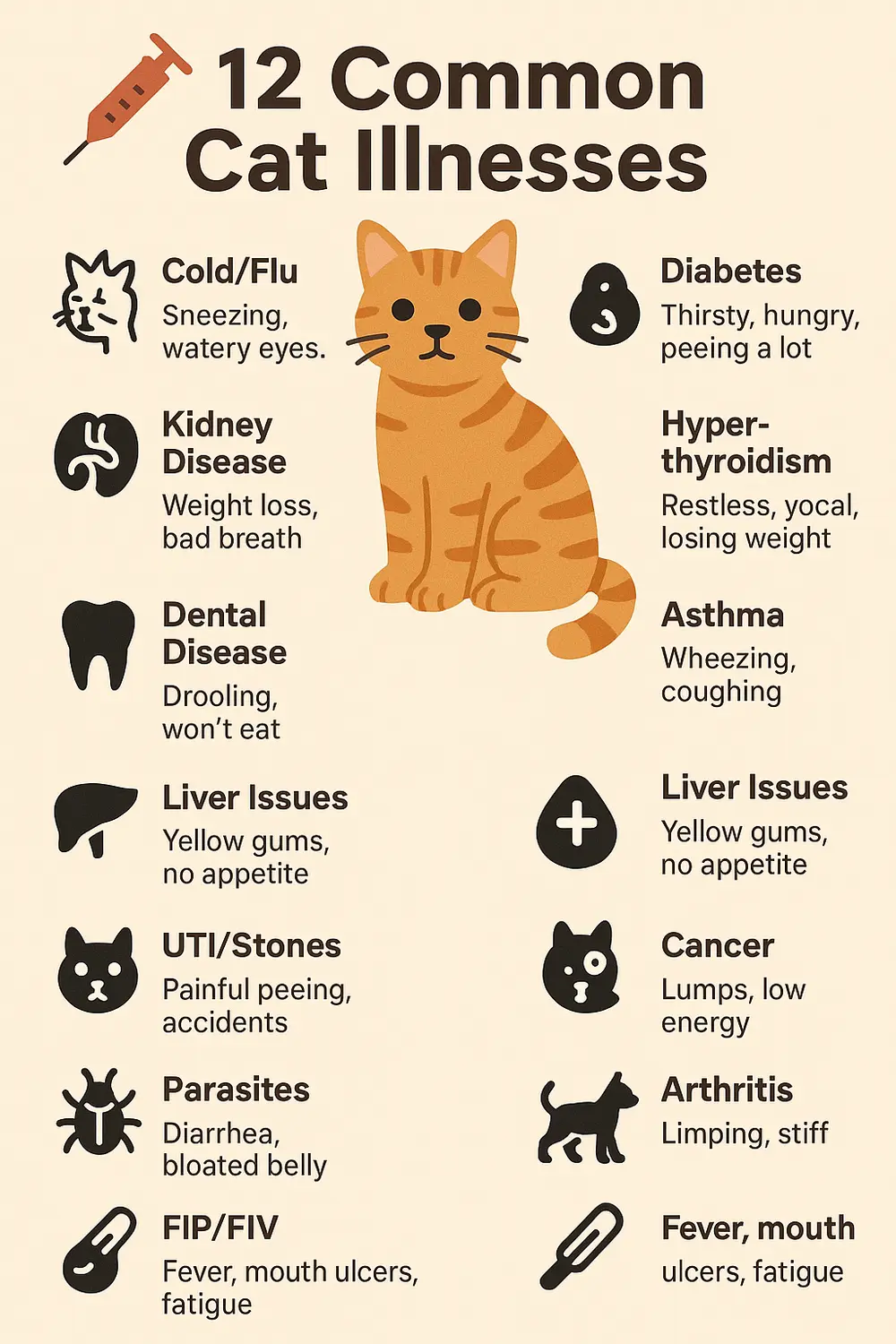
Upper Respiratory Infections
A runny nose, sneezing, watery eyes, and coughing may also indicate either a viral or bacterial infection, particularly feline herpesvirus or calicivirus. They are very contagious, especially in a household with a lot of cats. Most symptoms resemble those of a cold in humans.
Diabetes Mellitus
Indicators such as increased thirst, sudden increased appetite, and urinating more than before are all concerns. This can be an indication of diabetes requiring medical management, so early detection is essential to prevent complications like ketoacidosis.
Chronic Kidney Disease
One of the most common illnesses in older cats, this condition typically presents as Noticeable weight loss, excessive thirst, and changes in urination patterns. Even if a cat is exhibiting subtle signs of illness, such as bad breath or a change in food preferences, this can indicate kidney problems.
Hyperthyroidism
Hyperthyroidism may be the issue if a cat is losing weight but has a healthy appetite and appears restless, could be a cause. Note that if hyperthyroidism is not treated, it can lead to significant thyroid problems.
Dental Disease
Mouth pain, drooling, unpleasant breath, or difficulty eating are all symptoms of periodontal disease. Many of us don’t realize that dental problems are a common yet often overlooked sign of a sick cat.
Feline Asthma
Cats can do a variety of coughs, including wheezing coughs. When your cat is coughing with labored breathing, it can be mistaken for a hairball. Feline asthma is a serious but manageable condition when detected early.
Liver Disease
Jaundice, which is the yellowing of the eyes or gums, along with vomiting or loss of appetite, is often associated with the liver. These conditions will all require immediate Emergency Care as liver diseases progress rapidly.
Bladder Infections or Stones
Straining in the box, urinating outside the box, or exhibiting signs of pain during urination may be indicative of a urinary tract infection or bladder stones. These are vital signs of a sick cat that should never be ignored.
Cancer
Signs such as Unexplained weight loss, vomiting that won’t quit, bumps or lumps, or lethargy can indicate intestinal cancer or other forms of cancer. When detected, early outcomes improve significantly.
Parasites
Fleas, ticks, and intestinal worms can induce itching, scooting, diarrhea, or a distended stomach. These parasites are particularly prevalent in kittens or outdoor cats and require timely deworming or treatment.
Arthritis
Limping, stiffness and a reluctance to jump or play are all signs of joint pain, especially in older cats. They may not vocally express their discomfort, but changes in mobility are common indicators of a sick cat suffering from arthritis.
FIP, FIV, or Calicivirus
Viral infections can produce a range of clinical signs and symptoms, including fever, sneezing, mouth ulcers, and lethargy. Some may be relatively mild, while others can be life-threatening – early intervention is crucial.
Knowing the medical conditions related to the signs of a sick cat means you can be proactive and responsible. You should always consult your Veterinary Hospital to seek professional veterinary advice if your cat exhibits any sudden or unusual symptoms; early diagnosis can save lives.
To explore common feline illnesses more in-depth, check out WebMD’s page on common health problems in cats.
Home Health Checks You Can Do
Monitoring your cat’s well-being doesn’t always require a trip to the vet. A few easy at-home checks will provide you with plenty of information to track your cat’s health. They will help you to catch the early signs of a sick cat before they become serious problems.
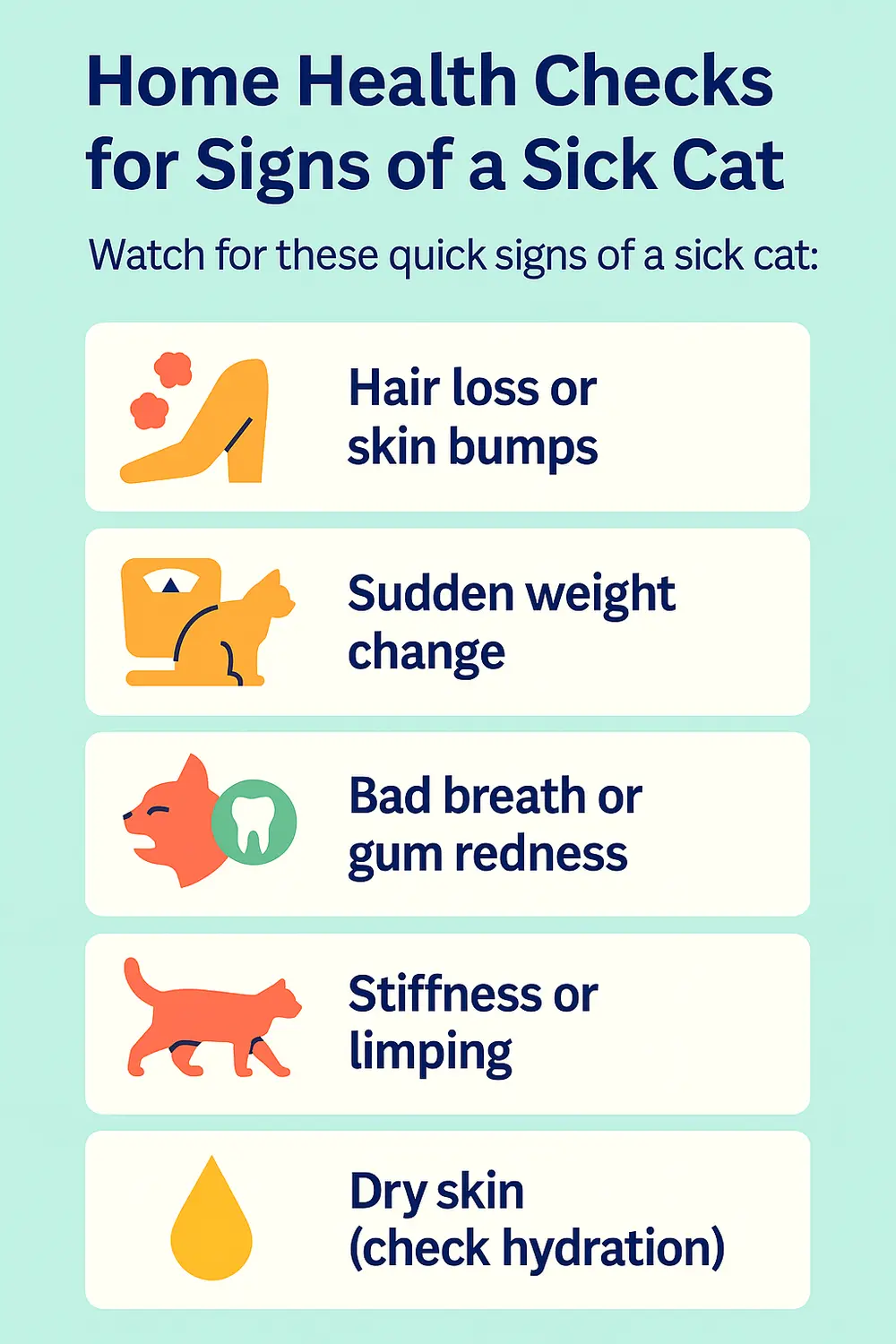
Weekly Fur & Skin Check
Gently run your hands through the coat of your cat to look for any covering bald patches, lumps, scabs, or any sign of fleas. Healthy skin should be smooth and free from irritation.
Monthly Weigh-In
Sudden weight changes are often one of the first signs of a sick cat. Track your cat’s weight changes each month using a pet scale, or weigh your cat and subtract your weight.
Dental Checks
Lift the lip and examine the gums and teeth. Redness, swelling, bad breath, or tartar build-up could be signs of dental disease, a common but often overlooked problem in cats.
Joint Mobility Test
Gently flex your cat’s legs and hips. Watch for stiffness, resistance, or pain. Trouble jumping or reluctance to move might signal arthritis or discomfort.
Hydration Test
Squeeze a little loose skin at the scruff and let go. If it slowly flattens, your cat is likely dehydrated — a critical indicator of an ill cat and something that should be addressed immediately.
Maintain a cat health journal. Record weight weekly, eating habits (length and frequency), mood, energy level, and any changes in the litter box. These notes can be handy during vet visits or as you monitor their health in the long term.
Sudden behavior changes in cats (such as hiding or aggression) can also be very subtle indicators of a sick animal.
When to Call the Vet Immediately
While some cat symptoms may appear mild, there are severe symptoms of a sick cat that call for immediate veterinary attention. Timing can make the difference between a common problem and a serious and possibly life-threatening emergency. If your cat shows any of the following symptoms, do not wait. Call your veterinarian right away:
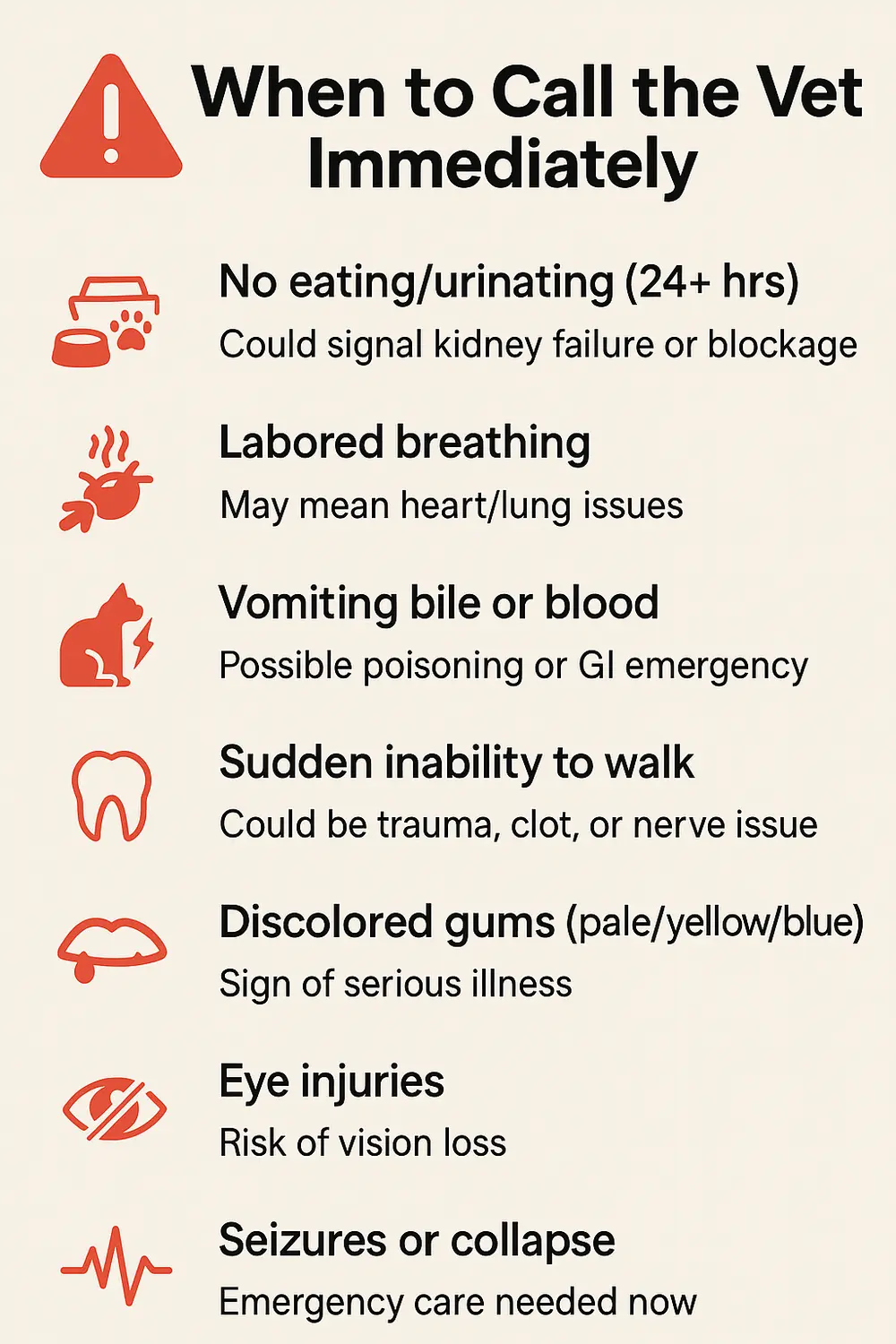
No Eating or Urinating for 24+ Hours
Cats who stop eating or using the litter box for more than a day may experience serious internal issues like kidney failure or urinary blockage.
Labored Breathing
Open-mouth breathing, wheezing, or rapid, shallow breathing could signal asthma, heart disease, or fluid in the lungs, all of which are also considered medical emergencies.
Vomiting Bile or Blood
Occasional vomiting might be harmless, but if you see yellow bile or blood, it’s a red flag for severe gastrointestinal distress or poisoning.
Sudden Inability to Walk
If your cat suddenly can’t walk or is dragging a limb, it may indicate trauma, neurological problems, injury, circulatory issues, or a dangerous blood clot.
Pale, Yellow, or Blue Gums
Healthy gums should be pink. Discolored gums can indicate anemia, liver failure, or poor oxygen circulation, which are concerning issues.
Eye Injuries
Squinting, discharge, and visible eye trauma can all worsen very quickly without treatment, leading to irreversible loss of vision.
Seizures or Collapse
Toxins, brain problems, or severe systemic illness can cause these alarming situations. Still, immediate care by a veterinarian is mandatory.
Cats are great at hiding their pain. When the symptoms are this severe, it means they’re no longer hiding the problem, and acting quickly may save your cat’s life.
What to Do If Your Cat Shows Symptoms
Recognizing the signs of a sick cat can be upsetting, but your response is vital to your furry friend’s healing. Cats are very adept at hiding pain and discomfort, so even the most minor signs should be noticed, and you should be aware. If you have noticed that your cat may be sick, here is what you should do:
Take Signs Seriously and React Quickly
The sooner you react to the signs of a sick cat, the better the outcome. Don’t wait until your cat’s condition worsens – prompt action could prevent serious health complications.
Contact Your Veterinarian
Explain with as many details as possible every symptom you have observed, including any behavioral changes, decreased appetite, increased thirst, or any changes in bathroom habits. It will help the vet assess the situation accurately and provide the best medical advice.
Monitor and Record Symptoms Every Day
Make a journal of everything about your cat and its habits – what it eats, how much water it drinks, how much activity it does, and if it shows any change in attitude. This log will help you develop a pattern and facilitate a more efficient diagnosis process.
Get Ready For The Vet Visit
Depending on the signs of a sick cat, your vet may do some diagnostic testing, including blood work, X-rays, or urinalysis, to discover what is truly going on.
Don’t Self-Medicate
Never administer guess treatments or human medications to your cat. Some over-the-counter medications can be poisonous to cats. You could make things worse.
Even the most modest actions of a sick cat (like a soft meow or slight withdrawal) could be their way of asking for help – please don’t ignore those whispers.
Some of these symptoms are emergent. Here’s a helpful list of emergency symptoms in cats that should never be ignored and that every cat owner should read and bookmark.
Prevention Tips for Lifelong Health
It is often far better and less expensive to prevent illness than to treat it. While it’s essential to know the signs of a sick cat, preventive care also starts your cat on a path that will keep them healthy and happy for years to come. Here are some ways to reduce your chances of problems:
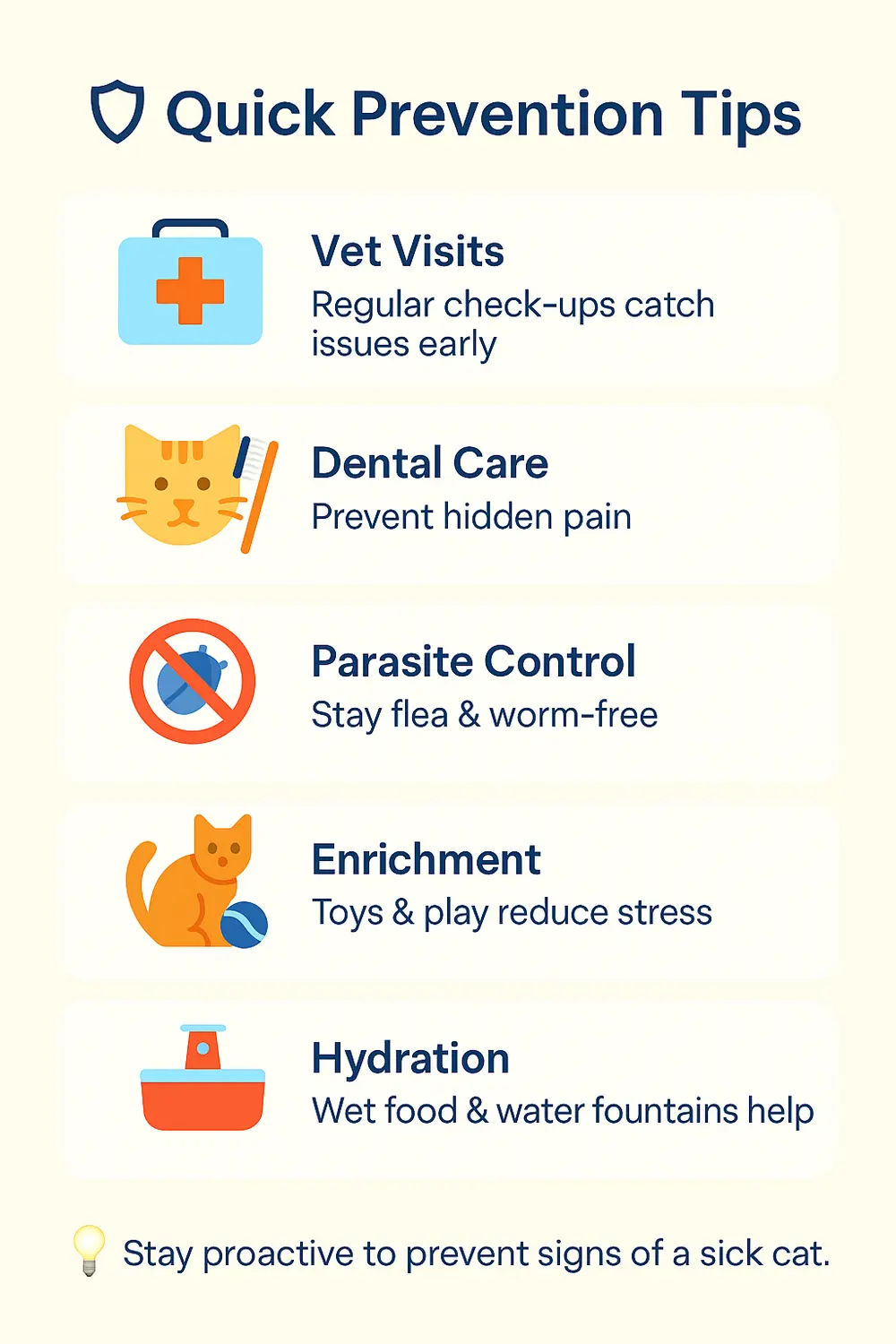
Schedule Regular Vet Exams
Health issues are often reversible if detected early; therefore, annual or biannual wellness checkups can help prevent serious problems in the future. A veterinarian checkup is your first line of defense against many unnoticed signs of a sick cat.
Dental Care
Brushing your cat’s teeth at home and scheduling dental cleaning appointments as needed are good preventative care measures to take against painful dental disease. Dental disease is prevalent but often overlooked as a cause of illness.
Parasite Prevention
Flea, tick, and worm prevention must be consistent at all times. Remember, parasites can cause not only discomfort for your cat, but prolonged neglect of parasites can lead to more serious health complications for your pet.
Encourage Mental and Physical Stimulation
Create an environment with toys, perches, scratching posts (and possibly supervised outside time) for your cat. Boredom and stress can cause behavioral changes that mimic the signs of illness.
Keep Your Cat Hydrated
Cats are natural low-water drinkers, but offering a water fountain or wet food can help encourage them to drink more. Hydration can be one of the most significant preventers of kidney disease, which is a common cause of the signs of a sick cat.
Manage Weight and Diet
Offer a balanced, age-appropriate diet and portion size. The primary contributor to a lot of health problems is obesity, and that can often contribute to a lack of awareness of even early warning signs.
Now that you know the signs of a sick cat – it is equally essential to establish a good foundation for daily care.
Here are some excellent cat care tips for beginners to help your feline friend stay happy and healthy.
A proactive care plan can not only reduce the likelihood of seeing the signs of a sick cat, but it can enhance the quality and give you more years with your cat. Prevention is truly the best medicine.
FAQs
How long should I wait to call the vet after noticing signs of a sick cat?
Honestly, you shouldn’t wait too long for your cat. If your cat is showing clear signs of illness, such as refusing food, breathing difficulty, or straining in the litter box, call your vet in the next 12-24 hours. Cats are masters at masking their pain, allowing symptoms to develop quickly. Better safe than sorry.
What are key early signs of a sick cat to watch for at home?
Many early warning signs of a sick cat can be overlooked if you are not paying attention. Some indicators to look for include changes in appetite, increased or decreased water intake, avoidance of cuddling, sleeping in unusual places, or not grooming as usual. These subtle shifts often reflect a problem that is occurring beneath the surface.
Is frequent vomiting a serious sign of a sick cat?
An occasional hairball or upset stomach is not usually a reason to panic. But, if your cat has vomited for two or more days, is vomiting blood, or is unable to keep food down, it is time to take action. Vomiting can be a serious sign of a sick cat, and that could mean an underlying illness, dehydration, or something much more serious.
Why is a refusal to eat significant for assessing signs of a sick cat?
One missed meal here, and there is no reason to panic. Still, if your cat is refusing to eat for over 24 hours, especially their favorite food, it could indicate problems as serious as dental pain, a potential infection, or liver issues. Not eating is a significant sign that your cat is unwell, and it should not be taken lightly.
Can changes in litter box habits indicate the signs of a sick cat?
Yes, it is something that many pet parents consistently overlook. If you notice your cat peeing more frequently, straining to pee, having blood in the litter box, or urinating altogether, it could be your cat’s way of saying, “Help!”
These changes often indicate a serious medical issue, such as a bladder infection, kidney problem, or digestive issue. These are among the most common signs of a sick cat.
Conclusion
Caring for a cat means more than feeding and petting. Cats can exhibit subtle signs of disturbances that often go unnoticed, which can signal a more significant issue. These signs can include sudden changes in behavior, appetite, increased thirst, or increases in vocal behavior.
The signs of illness in cats can be subtle or minor, but noticing their changes can have a significant impact on the outcome of treatment and recovery. The sooner you identify them, the sooner your pet has a chance of a full recovery.
Staying well-informed, being educated, keeping up with regular vet visits, and understanding your cat’s routine can help. Just keep in mind that you are more than a cat owner. You are your cat’s number-one advocate. If there is any doubt, you should always trust your instincts and seek professional advice. Because you better believe your cat would for sure do the same for you.

